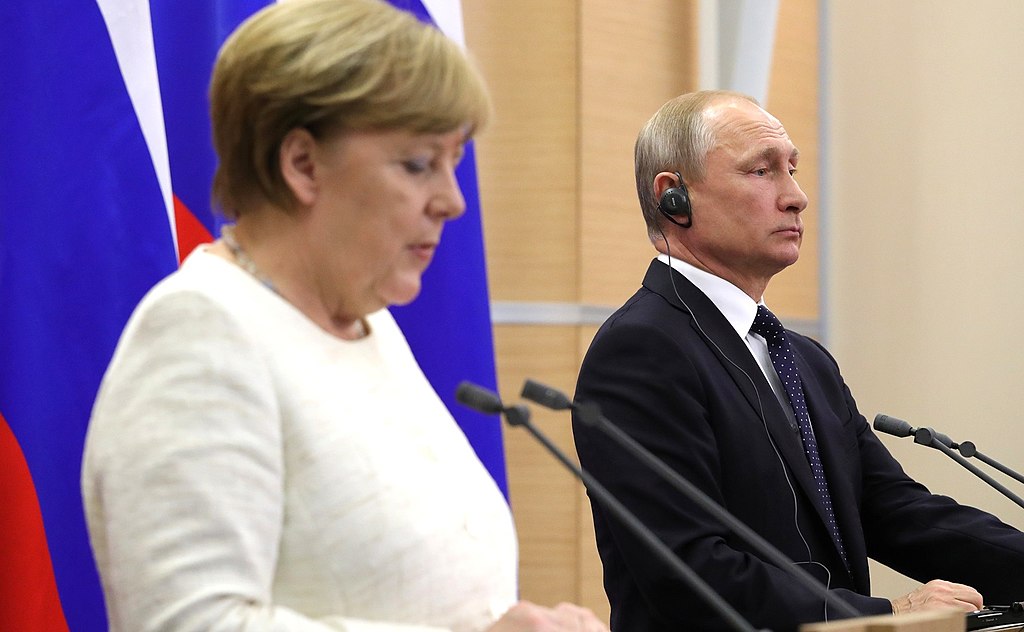Ukraine is struggling to internationalize the Crimean problem. For the West, that issue has been put on hold and energy ties with Russia seem to have priority, at least for the next 25 years.
According to the outgoing Germany’s Chancellor Angela Merkel, Europe will need to achieve climatic neutrality step by step by 2050, which means that in 25 years “no gas, or very small volumes of gas, will be supplied to Europe from Russia”. It is worth noting, however, that in 2014 the European Union adopted the Energy Performance of Buildings Directive that required all new public buildings to be nearly zero-energy by 2018, and all new buildings to be nearly zero-energy by the end of 2020. Given that such an idea has not been fully implemented to this day, it is questionable whether the EU will manage to implement its decarbonization agenda by 2025. Meanwhile, most European countries, including Germany, are expected to remain dependent on the Russian energy. That is why for Germany’s policy makers, and especially for the country’s business community, the construction of the Nord Stream 2 pipeline has a much greater importance than the status of Crimea or a possible solution to the never-ending conflict in the Donbass between the Western-backed Ukraine and Russia-sponsored forces.
During her recent visit to Kiev where she met with Ukraine’s President Volodymyr Zelensky, Merkel said that “natural gas should never be used as a geopolitical weapon”. That, however, does not mean that Russia will not try to benefit from its position of “a gas station masquerading as a country”. Prior to her trip to Ukraine, the German Chancellor met with Russian President Vladimir Putin in Moscow, trying to convince him to expand the gas transit contract with Ukraine that expires in 2024, so that Kiev could keep receiving billions of dollars for transit fees. The Kremlin, for its part, is ready to trade. The Russian leader openly said that a gas transit deal with Ukraine will depend on the European consumers signing contracts with Russia’s energy giant Gazprom. In other words, if European companies agree to buy large amounts of Russian natural gas after 2024, Gazprom will expand the gas transit contract with Kiev.
Ukraine, on the other hand, expects a minimum transit of the Russian natural gas. Presently, the gas transit contract between Ukraine’s state-owned Naftogaz company and Gazprom brings Kiev an annual income of about $3 billion. There is no doubt that the future of a gas transit through Ukraine to Europe will depend on wider geopolitical deals between Russia and the West, while Ukraine will continue to be treated as a political object rather than an autonomous actor in the international arena.
On August 23, just a day after Merkel’s meeting with Zelensky, Ukraine hosted an international summit dubbed Crimean Platform, whose goal was to publicize the Crimean issue. The event drew officials from more than 40 countries, but not the German Chancellor. Instead, Germany was represented by the Minister of the Economy and Energy, Peter Altmaier, which is another indication that for Berlin, energy and business have priority over Ukraine’s territorial disputes with Moscow. In addition to that, it became clear that Germany does not intend to sell weapons to Ukraine, which drew criticism in Kiev.
Moreover, some European leaders who attended the summit verbally supported Ukraine’s ambitions to return Crimea under its jurisdiction, but essentially used the event to improve their own countries’ positions. For instance, Slovenian President Borut Pahor stressed that Slovenia had good relations with both Russia and Ukraine and said he hoped the two nations would work out their problems.
“I came here also to call for a sincere dialogue between Ukraine and the Russian Federation. As a strong advocate of good neighborly relations, I sincerely wish Ukraine and Russia will someday, somehow settle their bilateral relations”, Pahor said.
From the Ukrainian perspective, Pahor “stabbed Kiev in the back”, and he was not the only doing so. Hungarian President Janos Ader – who does not have real power at home, given that Prime Minister Viktor Orban is the one who is pulling strings in Hungary – formally supported Ukraine’s sovereignty and territorial integrity, but during the meeting with Zelensky he emphasized that “the rights of Ukraine’s Hungarian community were more restricted than they had been under the Soviet Union.”
It is not very likely that Ukraine will get any better treatment in the United States. Although Zelensky has been insisting on meeting with the US President Joe Biden for months, the US leader postponed the summit a few times. Indeed, for Biden, meetings with Putin and Merkel had a priority over Zelensky. The two presidents will finally meet in Washington on August 31, but it is not very probable that the Ukrainian leader will get what many in the country would expect – firm guarantees that Ukraine will join NATO.
For the foreseeable future, the West will keep using Ukraine as a tool against Russia – although unlikely as a NATO member – while the Kremlin will continue to use its proxies in the Donbass – though Moscow will not incorporate the region into the Russian Federation – as an instrument against Kiev. At the same time, Moscow and its Western partners will keep developing their energy cooperation. Business is business, after all.
Image credit: kremlin.ru

